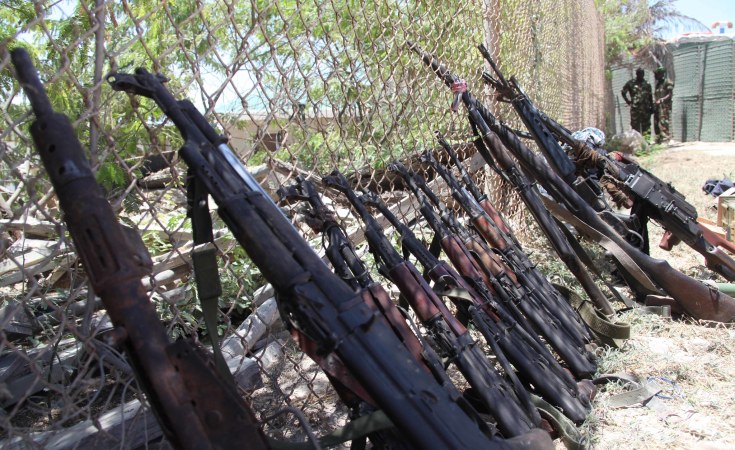Washington — The United States is trying to curb the flow of weapons to the Islamic State terror group's affiliate in Somalia, taking aim at a smuggling operation that is also helping to arm its al-Qaida-linked rival, al-Shabab, with weapons from Iran.
The U.S. Treasury Department Tuesday announced sanctions against eight individuals and one company all involved in the yearslong effort to smuggle millions of dollars of weapons between Yemen and Somalia.
Among those targeted are Abdirahman Fahiye, believed to lead IS-Somalia's day-to-day operations, Mohamed Ahmed Qahiye, who heads IS-Somalia's intelligence wing, and Isse Mohamoud Yusuf, a former pirate who continues to run weapons on behalf of IS.
The sanctions "take direct aim at the networks funding and supplying both ISIS-Somalia and al-Shabab," Brian Nelson, the undersecretary for terrorism and financial intelligence, said in a statement, using another acronym for the IS affiliate.
"The involvement of those designated [Tuesday] in other criminal activity, including piracy and illegal fishing, demonstrates the extent of ISIS-Somalia's integration with illicit networks and other terrorist organizations operating in the region," Nelson added.
Tuesday's move by the Treasury Department follows an earlier round of sanctions, introduced last month, aimed at crippling al-Shabab's ability to raise money.
The new sanctions, though, focus on smugglers and terror leaders said to be enmeshed in IS-Somalia, despite current or past ties to al-Shabab, links to al-Qaida's affiliate in Yemen or links to Iran.
"I don't think it's anything ideological," Caleb Weiss, a senior analyst with the Foundation for Defense of Democracies and the Bridgeway Foundation, told VOA via email.
"They're using the same basic smuggling networks and smugglers that are happy to do business with the highest bidder," Weiss said. "I am sure Iran is also looking at this as an angle to make extra cash, as well."
According to U.S. Treasury officials, it has been big business.
Abdirahman Mohamed Omar, an IS-Somalia member and weapons smuggler, is said to have completed more than $2 million in transactions over the past four years, procuring weapons like AK-47 machine guns and rocket-propelled grenades, for his own group and for al-Shabab.
Another sanctioned smuggler, Mahad Isse Aden, is alleged to have transferred almost $800,000 to arms suppliers in Yemen between 2015 and 2020.
Even the senior IS-Somalia officials have not been above doing business with Iran.
The Treasury Department said in early 2020, IS-Somalia's intelligence chief, Qahiye, was part of a senior delegation that got a $10,000 payment from Iranian businessmen.
But there are questions as to where all the weapons and money are going as some recent intelligence estimates have questioned the group's capabilities.
Information gathered by United Nations member states and published in a report this past July, indicated the group has fewer than 300 fighters in Puntland, with "a small footprint that lacks the capacity to undertake major operations as a result of attacks from [al-Qaida linked] al-Shabab."
Even the information issued by the U.S. noted that despite efforts to raise funds and the movement of hundreds of thousands of dollars, IS-Somalia members receive low wages.
Some former counterterrorism officials think that may have to do with IS-Somalia's focus, which is not on Somalia itself.
IS-Somalia "is much more invested in its ability to support ISIS networks elsewhere," Edmund Fitton-Brown, a former top U.N. official who is now a senior adviser to the New York and Berlin-based Counter Extremism Project (CEP), told VOA.
The notion is supported by intelligence that indicates that despite its small size, IS-Somalia is home to one of the Islamic State's key regional hubs.
U.N. member state intelligence published earlier this year suggests the so-called al-Karrar office based in Somalia serves as a key financial hub for IS, moving money from Yemen to Afghanistan to help buy weapons and pay the salaries of IS fighters in Somalia, Mozambique and the Democratic Republic of Congo.


